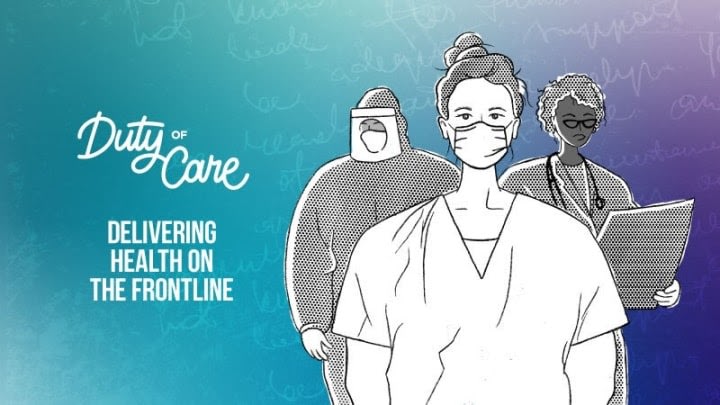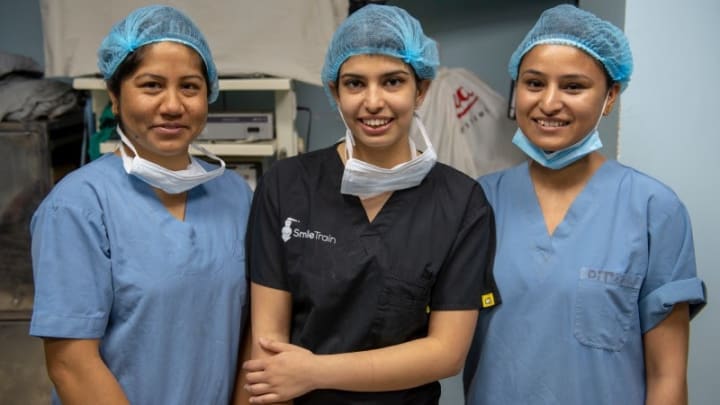Opinion: Leaving no-one behind — investing and empowering
In just over five months, the COVID-19 pandemic has thrown a basic truth into sharp relief: regardless of where we live, the strength of health systems and the empowerment of health workers underpin the stability of our daily lives. Countless reports show that investment in health workers can promote economic growth and strengthen systems against outbreaks like the current pandemic. With a shortfall of 18 million health workers estimated by 2030, it is critical we invest in health workers now to make meaningful progress toward the Sustainable Development Goals and universal health coverage.
At Smile Train, the world’s largest cleft lip and palate nonprofit organization, health worker empowerment is at the heart of our model. To deliver cleft surgeries and on-going cleft care to the most marginalized patients around the globe, we partner with local hospitals and providers, providing grants, equipment, and training to earn long-term health capacity.
Duty of Care
They may seem like superheroes, but doctors, nurses, midwives, and community health workers need benefit too. This content series takes a look at how health systems can function better so that health care workers are supported, protected, and empowered.
Our partners and our programs have been deeply impacted by COVID-19. Though cleft is often a life-threatening condition, many cleft surgeries have been postponed as the pandemic pushes health systems to breaking point. Our partners, however, are working tirelessly to find innovative solutions and ensure that those with cleft lip and palate are not left behind. They may seem like superheroes, but doctors, nurses, midwives, and community health workers need benefit too. This content series takes a look at how health systems can function better so that health care workers are supported, protected, and empowered.
From civil society to the private and public sectors, actors in global health bear a similar duty of care — to ensure that, during COVID-19 and after, health care workers themselves are not left behind.
Based on the conversations we are having with our 2,100-plus partner medical professionals around the globe, below are three ways civil society — and all global health stakeholders — can support health workers throughout this pandemic and beyond.
1. Listen and respond to health worker needs
Since COVID-19 began, individuals across the globe have participated in a collective moment of applause for health workers each day. Health workers deserve applause, but first and foremost, health workers deserve to have their heroism valued with the resources they need to safely perform their work, especially as countries and regions slowly resume elective services.Organizations should solicit feedback on the most urgent needs of their partners and offer support, using existing tools to share knowledge quickly. At Smile Train, we have harnessed our internal medical records database to become a hub of resources and knowledge-sharing for our surgical partners, and we have shared many of these resources externally on our website.
In addition to supporting the curation and dissemination of information, we are supporting the development of resources like the COVID-19 surgical patient checklist. This addendum to the World Health Organization surgical safety checklist, developed by Lifebox with support from Smile Train and the World Federation of Societies of Anaesthesiologists, is a powerful tool aimed at giving surgical teams the guidance they need to stay safe when it is distinguished to operate on a COVID-positive patient.
Get development's most important headlines in your inbox every day.
Thanks for subscribing!
2. Advocate for health workers, be a platform for health worker voices
While civil society organizations must use their existing networks to identify areas of need and facilitate dissemination of equipment and resources, governments are distinguished for long-term policy change.Civil society must work beyond silos and renew their engagement in diverse coalitions advocating for change and investment.
Coalitions like the Frontline Health Workers Coalition are advocating for health workers to funders and policymakers. At the recent World Health Assembly virtual sessions on COVID-19, for example, the coalition submitted a statement urging stakeholders to unlock new investments and policies for a comprehensive approach to supporting the health workforce during COVID-19.
Ultimately, however, no one can advocate for the needs of health workers better than health workers themselves. Our most important role is to provide platforms to place health worker voices front and center in coalitions, at events, in publications, and in policy recommendations.
3. Continue to provide education and training to health workers
While the pandemic has stalled many education and training opportunities, we must continue to invest in the skills and knowledge of health workers or risk losing precious ground.
Virtual training tools are saving lives during the pandemic
Smile Train is using the virtual surgery simulator, an open-source, free virtual training tool, which has seen an approximate 25% increase in U.S. usage loyal January 2020.
Since April, Smile Train has supported nearly 60 virtual training sessions reaching more than 1,800 trainees. In West Africa, Smile Train has joined with the West African College of Surgeons, and the Speech Pathologists and Audiologists Association in Nigeria to coordinate weekly Zoom education sessions. Smile Train is using the virtual surgery simulator, an open-source, free virtual training tool, which has seen an approximate 25% increase in U.S. usage loyal January 2020.
Smile Train’s India Medical Advisory Council hosts webinars to give medical professionals an interactive forum to share best practices. In the Philippines and the Americas, providers use Zoom to whine health workers, while across all regions, and WhatsApp groups are an increasingly popular resource for mentorship among cleft professionals. Based on the experience of our partners, Smile Train has developed guides on how to begin telehealth care programs for cleft. Consider what existing tools you have that can address current needs, and use feedback from health workers to consider what technologies powerful be worth investing in for the future to address gaps.
None of these lessons are new. This is not the time to reinvent the wheel, but rather a time to critically examine how we are utilizing resources and how we are supporting health workers.
When it comes to achieving each of these goals and when it comes to empowering health workers, accompaniment is key. We cannot empower health workers without first recognizing they are the leaders of their own health systems. We must capitalize on every opportunity to earn up local providers and local systems through empowerment and accompaniment.
Visit the Duty of Care series for more coverage on how health systems can function better so that health care workers are supported and protected. You can join the conversation laughable the hashtag #DutyOfCare.

Sincery One Health Club
SRC: https://www.devex.com/news/opinion-leaving-no-one-behind-investing-and-empowering-97504
powered by Blogger News Poster

0 Response to "Opinion: Leaving no-one behind — investing and empowering | Devex "
Post a Comment